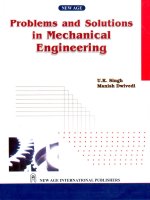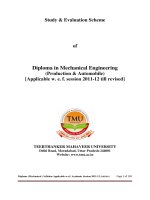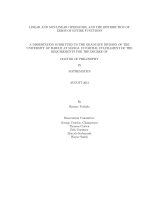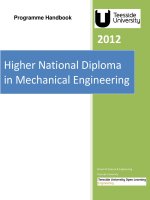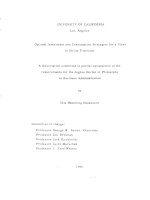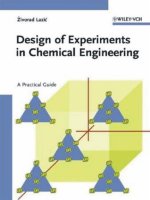Doctor of filosophy in mechanical engineering
Bạn đang xem bản rút gọn của tài liệu. Xem và tải ngay bản đầy đủ của tài liệu tại đây (2.67 MB, 61 trang )
Graduate Student Handbook
DOCTOR OF PHILOSOPHY
IN
MECHANICAL ENGINEERING
Erik Jonsson School of Engineering and Computer Science
The University of Texas at Dallas
Revised
October 2015
Doctor of Philosophy in Mechanical Engineering
Page 1
Doctor of Philosophy in Mechanical Engineering
Table of Contents
Introduction .................................................................................................................................................. 4
Program Administration .............................................................................................................................. 5
Area Faculty .............................................................................................................................................. 5
Graduate Studies Committee.................................................................................................................... 5
Associate Department Head for Graduate Studies................................................................................... 5
Advising ........................................................................................................................................................ 5
Research Advisor ....................................................................................................................................... 5
Graduate Program Coordinator ................................................................................................................ 5
Getting Started in the Graduate Program ................................................................................................... 6
Orientation for International Students ..................................................................................................... 6
Department Orientation & Meeting Graduate Advisors .......................................................................... 6
Registration & Obtaining UTD Identification Card .................................................................................... 6
Graduate Teaching & Research Assistants................................................................................................ 6
Program Facilities ......................................................................................................................................... 7
University Facilities ................................................................................................................................... 7-8
Application and Admission to Graduate Program ................................................................................. 9-10
Application Process ................................................................................................................................... 9
Types of Admission ................................................................................................................................. 10
Conditional Admission.......................................................................................................................... 10
Funding Opportunities ............................................................................................................................... 11
Jonsson School Graduate Study Scholarship .......................................................................................... 11
Teaching Assistants ................................................................................................................................. 11
Research Assistants ................................................................................................................................. 11
Registration ................................................................................................................................................ 12
Degree Plan and Academic Standing .................................................................................................... 13-19
Degree Plan ........................................................................................................................................ 13-17
Graduate Transfer Credit Policies ........................................................................................................... 18
Time Limits .............................................................................................................................................. 18
Catalog Policy .......................................................................................................................................... 18
Page 2
Doctor of Philosophy in Mechanical Engineering
Academic Standing .................................................................................................................................. 19
Graduate Grading Scale .......................................................................................................................... 19
Doctoral Program Requirements .......................................................................................................... 20-25
Milestones Agreement Form ............................................................................................................. 20-21
Timeline for Degree Completion .......................................................................................................... 20
Qualifying Examination ...................................................................................................................... 21-22
Doctoral Candidacy and Dissertation................................................................................................. 23-25
Doctoral Candidacy .............................................................................................................................. 23
Supervising Committee ........................................................................................................................ 23
Comprehensive Examination/Dissertation Proposal ...................................................................... 23-24
Doctoral Dissertation ...................................................................................................................... 24-25
Career Advising........................................................................................................................................... 25
Graduation.................................................................................................................................................. 25
APPENDICES
Appendix A – Mechanical Engineering Faculty
Appendix B – Milestones Agreement Form
Appendix C – Mechanical Engineering PhD Degree Plan
Appendix D – PhD Transfer of Credit Request Form
Appendix E – Committee Appointment Form
Appendix F – Qualifying Examination Study List
Appendix G – Qualifying Examination Application
Appendix H – Comprehensive Examination Checklist
Appendix I – Request for Comprehensive Examination
Appendix J – Comprehensive Examination Report
Appendix K – Request for Final Oral Examination
Appendix L – Final Oral Examination Report
Appendix M – Graduation Checklist
Key: Old Content
New Content
Page 3
Doctor of Philosophy in Mechanical Engineering
Introduction
The faculty, staff and students in the Mechanical Engineering Program would like to welcome
you to the doctoral program in Mechanical Engineering. This handbook is designed to provide
information on policies and procedures in the Ph.D. program. This handbook, the UTD Graduate
Student Guide, the Graduate Catalog and the Mechanical Engineering Department website will
serve as sources of information for you as you progress through our program. This is not an
official document or supplement to the University catalog or other official publications. For
official University policy regarding graduate studies, please see the UTD Graduate Student
Guide online at: and the UTD Graduate
Catalog: />This handbook is subject to change in accordance with university and program amendments.
Students are responsible for remaining updated and in compliance with policies throughout
their attendance in the program and prior to graduation applications being processed. The
policies set forth in this handbook default to new university policies that may be amended
without notice. When changes occur, we will do our best to notify you in a timely manner.
Check your UTD e-mail regularly. If there are questions not answered in this handbook or if you
are unsure about policies and procedures, please contact the Mechanical Engineering Graduate
Program Administrator.
Graduate Program Objectives
The Ph.D. program in Mechanical Engineering at the University of Texas at Dallas is offered as a
part of a unique collaboration with the University of Texas at Arlington. The educational
objective of the joint doctoral program is to prepare talented doctoral students for careers in
which they will create new technologies and processes for the design, manufacturing, and
operation of components and systems involving mechanical function (e.g., motion, structural,
thermal, fluidic) at all size scales. Given the key enabling role of mechanical engineering in all
areas of technology, the graduates of this program will be technical leaders in emerging and
existing industry in Texas, the Nation, and the world.
Page 4
Doctor of Philosophy in Mechanical Engineering
Program Administration
The administration of the graduate program is divided among committees and individuals each
having specific responsibilities. Their roles and responsibilities are described below. Two of the
most important individuals with whom you will interact are your research advisor and the
graduate program administrator. Their roles are described in the Advising section.
Area Faculty:
The faculty who participate in teaching and research supervision within a particular degree
program constitute that program’s Area Faculty. The Area Faculty are responsible for the
program’s curriculum and requirements, advising and mentoring, and evaluation of student
performance and progress. Most faculty participate in more than one degree program.
Graduate Studies Committee:
The role of the Graduate Studies Committee is to serve the needs of the graduate students and
faculty in the department. It plays a role in developing, implementing, and monitoring policies
and procedures including admissions, course scheduling, and the evaluation on qualifying
papers and projects. Committee membership changes periodically.
Associate Department Head for Graduate Studies:
The Associate Department Head for Graduate Studies (Dr. Hongbing Lu) chairs the Graduate
Studies Committee and oversees the graduate program.
Advising:
Research Advisor: The research advisor is the primary faculty member with whom the student
works. The research advisor provides mentoring in research, guidance in course selections,
assists in the preparation of the degree plan and Milestones Agreement Form, and career
guidance. The research advisor supervises and must sign off on the student’s completion of the
qualifying exam and other documents, such as proposals and papers leading up to degree
completion. In general, all new students have selected or have been selected by a research
advisor upon admission to the program. Under circumstances where a student is admitted to
the Ph.D. program without an assigned research advisor, the student will be given until their
second semester in the program to locate a research advisor. In the event that a student must
change research advisors, the student will be given no more than one semester to locate a new
research advisor before being dismissed from the program.
Graduate Program Administrator: The mechanical engineering graduate program
administrator may be consulted on any matter pertaining to doctoral study. Issues related to
degree requirements, program procedures, credit transfers, and other student academic issues
should be addressed to the graduate program administrator. Currently, the mechanical
engineering graduate program administrator is Ashley Bradberry.
Page 5
Doctor of Philosophy in Mechanical Engineering
Getting Started in the Program
Orientation for International Students
All F-1 and J-1 visa holders must attend an International Student Orientation session. There will
be multiple sessions offered leading up to the start of each semester. Students should register
for their orientation session as early as possible. This orientation is required before they can be
advised and register for classes.
Department Orientation & Meeting Graduate Program Advisors
All new students are required to attend the Mechanical Engineering New Graduate Student
Orientation prior to registering in courses. Official announcements and invitations to this
orientation will be sent by email from the Mechanical Engineering Department. Prior to
attending this orientation session, students should review this handbook, the semester ME
course offerings, the ME section of the Graduate Catalog, and the ME department website, and
have a plan for which courses they wish to take. At this orientation, students will meet with a
faculty advisor, and have their courses approved for registration. Once a student has passed 9
hours of coursework and achieved at least a 3.0 GPA, the student will not be required to meet
with the ME faculty advisor for the purpose of being advised for courses and cleared for
registration.
Registration and Obtaining UTD Identification (ID) Card
Once the required orientation session(s) have been completed, students may register for
courses with the ME graduate program administrator. After completing registration, students
will be required to obtain a Comet Card, the official identification card for all UTD students,
faculty and staff. This card allows the use of campus facilities and services.
Graduate Teaching and Research Assistants
Newly appointed TA’s and RA’s will be required to attend additional orientation sessions given
separately by the Office of Graduate Studies and the Human Resources Office.
The Office of Graduate Studies orientation is a two day program. TA’s must attend both days of
this program and RA’s must only attend the first day of the program.
The Human Resources Office will conduct a separate orientation for all new hires. Both TA’s and
RA’s must attend the three hour session.
Page 6
Doctor of Philosophy in Mechanical Engineering
Program Facilities
The Engineering and Computer Science Building and the new Natural Science and Engineering
Research Laboratory provide extensive facilities for teaching and research. These include wind
tunnels, material test systems, nanoindenter, impact facilities, ultra-high speed camera, motion
capture system, force plates, elextromyography, rheometer, DMA, DSC, TGA, XPS, FTIR, NMR,
TGA, DSC, XRD, µ-Raman, Fluorescence Spectrometer, FIB/SEM, and TEM. A Class 10000
microelectronics clean room facility, including e-beam lithography, sputter deposition, PECVD,
LPCVD, etch, ash and evaporation, is available for student projects and research.
In addition to the facilities on campus, cooperative arrangements have been established with
many local industries to make their facilities available to UT Dallas graduate engineering
students. Students will also have the opportunity to work closely with researchers on the
University of Texas at Arlington campus.
Machine Shop
The Mechanical Engineering Machine Shop gives students the experience of building custom
mechanical components or systems for class assignments, research and industry sponsors. The
shop houses 10 computer stations, several computer numeric control milling machines, welding
machines, different types of saws, a plasma cutter and an air compressor.
University Facilities
A campus map can be found on the university website: />
Office of Graduate Studies
The Office of Graduate Studies is located in the Founders Annex corridor, at FA 3.104. The staff
in this office can answer questions and supply the forms that students will need while they are
enrolled here. Students will find helpful information and important deadlines on the Office of
Graduate Studies website: />
Computer Labs
Computer Labs for student use can be found on campus in the following locations:
Engineering Open Access Lab (CN 1.206)
Solarium Engineering Open Access Lab (ECSN 4.324)
Eugene McDermott Library
The McDermott Library is a valuable resource for all students; housing books, reference
material, a copy center and study areas.
Page 7
Doctor of Philosophy in Mechanical Engineering
Multicultural Center
The Multicultural Center is committed to providing quality cultural programs, educational
resources and support services to the UT Dallas community.
Health Center
A health center is available to meet medical needs of students. A full description of the services
offered by the health center can be found on the university website:
/>
Student Counseling Center
The Student Counseling Center provides programs and services designed to assist students with
managing academic and personal demands more effectively.
Student Union
The Student Union has numerous facilities and offices of interest to all students. In it are four
private meeting rooms, lounges, three food service areas, billiards and table tennis, and video
game room. The Union is also home to the Comet Center, the Student Union and Activities
Advisory Board (SUAAB), Child Care Center and Student Government. The Student Union offers
opportunities for students, faculty and staff to relax, eat, have fun, learn, socialize and become
an active part of the UTD community.
Visitor Center and University Bookstore
The Visitor Center and University Bookstore building includes amenities such as a coffee shop,
the Technology Store, the Copy Center and a multipurpose room.
Activity Center
The Activity Center is available to all students, faculty and staff and contains a fitness center,
four racquetball courts, two squash courts, four basketball courts, and a 25-yard swimming
pool.
Career Center
Career Center counselors are available to assist students with the preparations of job searching.
/>
Online Information Resources
Information on NetID/password issues, email accounts, wireless network setup and general
information on computer related problems can be found on the Information Resources
website: />
Page 8
Doctor of Philosophy in Mechanical Engineering
Application and Admission to Graduate Program
Application Process
A student applying for admission to the Mechanical Engineering Graduate Program must
submit an application form and relevant supporting documentation to the UTD Office of
Admission and Enrollment Services to be considered for admission and any form of University
and School support, such as teaching assistantships and research assistantships. Online
submission of the application is now mandatory:
/>It is the applicant’s responsibility to see that all parts of an application have arrived at UTD.
Application status and receipt of materials may be checked via the online Applicant Center in
Galaxy: />
Requirements for Admission
The Ph.D. in Mechanical Engineering is awarded primarily to acknowledge the student’s success
in an original research project, the description of which is a significant contribution to the
literature of the discipline. Applicants for the doctoral program are therefore selected by the
Mechanical Engineering Graduate Committee on the basis of research aptitude as well as
academic record. Applicants for the doctoral program are considered on an individual basis.
The following are guidelines for admission to the Ph.D. program in Mechanical Engineering:
A master’s or bachelor’s degree in engineering or one of the natural sciences
from an accredited U.S. institution, or from a comparable international university
A grade point average of 3.3 or better on a 4-point scale.
GRE scores of 150, 160 and 4 for the verbal, quantitative and analytical
components, respectively, are advisable based on our experience with student
success (See also UTD requirements for English proficiency.)
Three letters of recommendation from individuals who are familiar with the
student’s record, and are able to judge the candidate’s probability of success in
pursuing doctoral study in Mechanical Engineering.
A statement of purpose describing motivation for doctoral study and how it
relates to their professional goals.
A detailed resume of all education and work history.
All students originating from countries where English is not one of the official
national languages must submit an acceptable English proficiency exam score.
Minimum acceptable score guidelines can be obtained on the Graduate
Admissions webpage for international students:
/>
Page 9
Doctor of Philosophy in Mechanical Engineering
Achievement of specified minimum scores on standardized tests is not sufficient to ensure
admission. The ME program faculty may change these criteria in order to improve the quality of
the ME Graduate Program.
Student’s whose preparation is deficient in some respects will be required to take leveling or
prerequisite courses. A student may use at most three semester credit hours of 5000-level
courses in this category towards meeting the graduation requirements for the Ph.D. in
Mechanical Engineering. This limitation does not apply to courses with 5xxx numbers that are
not leveling courses.
For students who are interested in pursuing a Ph.D. but are unable to attend school full-time,
there is a part-time option. The guidelines for admission to the program and the degree
requirements are the same as for full-time Ph.D. students.
If a student was originally admitted into the program as a MS student and wishes to be
considered for admission to the doctoral program upon completion of the MS, they must, at
minimum, submit a new application and statement of purpose to the program by stated
deadlines and be admitted into that program in accordance with the normal admission
standards.
Non-Degree Seeking Option
Students who lack sufficient mechanical engineering background and/or fail to meet other
program requirements may be eligible for admission under the Graduate Non-Degree Seeking
program. A non-degree-seeking student must meet the same academic eligibility requirements
and English proficiency requirements as degree seeking students. Non-degree-seeking students
who are ultimately admitted to a degree program may transfer no more than 15 non-degree
credit hours to that degree program. A new application must be submitted when transferring
from non-degree to degree seeking status. Students should consult the graduate catalog for
additional details on the non-degree seeking option.
Types of Admission
Conditional Admission
Conditional admission may be granted to applicants who are deficient in undergraduate course
work considered essential for graduate study. Graduate students, admitted on a conditional
basis, will be notified in their department welcome letter of the deficiencies that must be
corrected in order to attain full graduate standing. Conditionally admitted graduate students
must meet with the graduate program administrator each semester, prior to registration, to
determine the remaining deficiencies in their academic program and have their course plan
approved.
Page 10
Doctor of Philosophy in Mechanical Engineering
Funding Opportunities
Full-time graduate students have three options for financial assistance through the Department
of Mechanical Engineering and all three are highly competitive. (Part-time students are not
eligible for financial assistance.) Students desiring financial assistance are encouraged to apply
to our graduate program as early as possible.
Jonsson School Graduate Study Scholarship is a $1,000 competitive, merit-based scholarship
awarded to incoming graduate students during the fall semester. All students entering MS or
PhD studies in mechanical engineering are eligible to apply. The Jonsson School Graduate Study
Scholarship Application can be found on the Jonsson School Scholarship page online.
Teaching Assistants (TAs) are selected and supported by the Mechanical Engineering
Department based on students’ academic merit and prior research experience. After students
have completed their first semester in the program, they may be considered by the
department's selection committee for teaching assistantships. TA applications can be found on
the Mechanical Engineering website and must be submitted to the Mechanical Engineering
Department office or emailed to
Research Assistants (RAs) are supported by individual mechanical engineering faculty through
faculty members’ research grants. Prospective students may contact faculty members directly
to discuss their research interests and possible RA support or they may submit an application to
the Mechanical Engineering Department. RA applications can be found on the Mechanical
Engineering website and must be submitted to the Mechanical Engineering Department office
or emailed to
Time Limits: The maximum period of teaching assistantship support of students enrolled in a
doctoral program is twelve semesters, whether long or summer, or one hundred doctoral level
semester hours.
Page 11
Doctor of Philosophy in Mechanical Engineering
Registration
Students pursuing a full-time program of graduate study should register for a minimum of nine
credit hours each long semester and six credit hours each summer semester (registration in
summer semesters is optional). General registration requirements are available in the Graduate
Catalog and on the University Registrar’s website: />Prior to registering each semester, Ph.D. students should meet with their research advisor to
discuss course selection. It may also be useful to meet with the graduate program administrator
to discuss course options during the first two years, when students are completing core
coursework.
After receiving approval from their research advisor, students that have completed nine hours
of coursework and have at least a 3.0 GPA are permitted to register themselves online.
Students may also register through the graduate program administrator by submitting a signed
registration form or by emailing a complete registration request from their UTD email account.
In the email, students must provide the course title and section, class number, instructor and
semester of request. Email registration requests are only accepted if the above information is
included and if the request is sent from their UTD email account.
Occasionally, there are “holds” placed on student accounts. Holds most commonly result from
missing documents, unpaid fees, or financial aid issues. All holds must be resolved before the
student can register. It is important that students review their account regularly and take care
of any holds as quickly as possible.
Registration for Research and Dissertation Courses
Students are not permitted to register themselves in Research or Dissertation hours. Permission
from the faculty member is required prior to registration in any of these courses. This approval
can be supplied on a signed registration form or by attaching their approval in a registration
request through email.
MECH 8V70 Advanced Research in Mechanical Engineering
MECH 8V99 Dissertation
Registration Change Procedure (Add/Drop)
Courses may be dropped online through the last day to withdraw, as designated by the
Registrar on the Academic Calendar. Courses may be dropped without entry to the academic
record until the date designated as such, normally within the first three weeks of the semester;
after this date, the course will be graded W or F, at the discretion of the instructor.
Page 12
Doctor of Philosophy in Mechanical Engineering
Degree Plan and Academic Standing
All students must submit an approved degree plan within the first three semesters of active
enrollment in the program. The purpose of this plan is to show how and when requirements
will be met. Degree plans should be initiated by the student and research advisor with the
guidance of the ME associate department head. The degree plan is a working document and
may be updated regularly to reflect the student’s developing research focus and career goals. A
degree plan demonstrating completion of all program requirements must be filed along with
the application for graduation at the completion of the student’s studies.
The Ph.D. program in Mechanical Engineering requires a minimum of 78 semester credit hours
beyond the baccalaureate degree. The breakdown is shown in the table below.
Category
Semester Credit Hours
Required Courses
12
Prescribed Electives
12
Math electives
Free Electives
6
12
Dissertation
6 (minimum)
Other: Research in Mechanical Engineering30 (minimum)
78 (minimum)
TOTAL
There are four technical areas of concentration in Mechanical Engineering, which are:
Dynamic Systems & Control (DSC)
Manufacturing & Design Innovation (MDI)
Mechanics & Materials (MM)
Thermal & Fluid Sciences (TFS)
Page 13
Doctor of Philosophy in Mechanical Engineering
Students in the Mechanical Engineering Ph.D. program are expected to complete twelve hours
of required courses. These twelve hours are made up of the program’s four core courses. A
student must receive a grade of B- or better in each of these required courses and maintain a
GPA of at least 3.0 to remain in good standing and satisfy the degree requirements.
A Ph.D. student in ME must take one core course from each of the four concentration areas in
the list below, and must receive a grade of B- or better in the four core courses.
Dynamic Systems and Control
MECH 6300 (EECS 6331, SYSM 6307) Linear Systems
MECH 6314 (SYSM 6306, BMEN 6372) Engineering Systems: Modeling and Simulation
Manufacturing and Design Innovation
MECH 6303 Computer Aided Design
Mechanics and Materials
MECH 6306 Continuum Mechanics
MECH 6350 Advanced Solid Mechanics
Thermal and Fluid Sciences
MECH 6370 Incompressible Fluid Mechanics
MECH 6373 Convective Heat Transfer
MECH 6374 Conductive and Radiative Heat Transfer
Page 14
Doctor of Philosophy in Mechanical Engineering
A Ph.D. student in mechanical engineering must take at least four courses from the list of
prescribed elective courses in one of the four areas of concentration. Upon approval from the
student’s research advisor and Mechanical Engineering Graduate Committee, a qualified
student can take other courses offered by UT Dallas or UT Arlington to satisfy the requirements
on prescribed electives. The following is a list of prescribed elective courses.
Dynamic Systems and Controls (DSC)
PhD students must take at least four courses from one concentration area.
MECH 6300 (EECS 6331, SYSM 6307) Linear Systems
MECH 6311 Advanced Mechanical Vibrations
MECH 6312 (EESC 6349) Random Processes
MECH 6313 (EECS 6336, BMEN 6388, SYSE 6324) Nonlinear Systems
MECH 6314 (SYSM 6306, BMEN 6372) Engineering Systems: Modeling and Simulation
MECH 6316 (SYSE 6322) Digital Control of Automotive Powertrain Systems
MECH 6317 (SYSM 6302) Dynamics of Complex Networks and Systems
MECH 6318 (SYSM 6305) Optimization Theory and Practice
MECH 6323 (SYSE 6323, EECS 6323) Robust Control Systems
MECH 6324 (EECS 6324) Robot Control
MECH 6V29 Special Topics in Controls and Dynamic Systems
Manufacturing and Design Innovation (MDI)
PhD students must take at least four courses from one concentration area.
MECH 6311 Advanced Mechanical Vibrations
MECH 6314 (BMEN 6372, SYSM 6306) Engineering Systems: Modeling and Simulation
MECH 6317 (EECS 6302, SYSM 6302) Dynamics of Complex Networks and Systems
MECH 6318 (SYSM 6305) Optimization Theory and Practice
MECH 6330 Multiscale Design and Optimization
MECH 6333 Materials Design and Manufacturing
MECH 6334 Smart Materials and Structures
MECH 6335 (OPRE 6340) Flexible Manufacturing Strategies
MECH 6337 (SYSM 6301) Systems Engineering, Architecture and Design
MECH 6341 (EEMF 6348, MSEN 6348) Lithography and Nanofabrication
MECH 6347 (EEMF 6382, MSEN 6382) Introduction to MEMS
MECH 6348 (EEMF 6322, MSEN 6322) Semiconductor Processing Technology
MECH 6353 Computational Mechanics
MECH 6354 Experimental Mechanics
MECH 6V49 Special Topics in Manufacturing and Design Innovation
Page 15
Doctor of Philosophy in Mechanical Engineering
Mechanics and Materials (MM)
PhD students must take at least four courses from one concentration area.
MECH 6306 Continuum Mechanics
MECH 6350 Advanced Solid Mechanics
MECH 6353 Computational Mechanics
MECH 6354 Experimental Mechanics
MECH 6355 Viscoelasticity
MECH 6367 (MSEN 6310) Mechanical Properties of Materials
MECH 6368 (MSEN 6350) Imperfections in Solids
MECH 6V69 Special Topics in Mechanics and Materials
Thermal and Fluid Sciences (TFS)
PhD students must take at least four courses from one concentration area.
MECH 6370 Incompressible Fluid Mechanics
MECH 6371 Computational Fluid Dynamics
MECH 6372 Turbulent Flows
MECH 6373 Convective Heat Transfer
MECH 6374 Conductive and Radiative Heat Transfer
MECH 6375 Boiling Heat Transfer and Two-Phase Flow
MECH 6377 Advanced Thermodynamics
MECH 6383 (EEMF 6383, PHYS 6383) Plasma Science
MECH 6V89 Special Topics in Thermal and Fluid Sciences
Mathematics Electives: six semester credit hours
MATH 6303 Theory of Complex Functions I
MATH 6313 Numerical Analysis
MATH 6315 Ordinary Differential Equations
MATH 6318 Numerical Analysis of Differential Equations
MATH 6319/MATH 6320 Principles and Techniques in Applied Mathematics I and II
MATH 6308 Inverse Problems and Applications
MATH 6321 Optimization
MATH 6340 Numerical Linear Algebra
MECH 6391 (EEGR 6381) Computational Methods in Engineering
STAT 6331 Statistical Inference I
STAT 6337 Adv. Statistical Methods I and STAT 6338 Adv. Statistical Methods II
STAT 6339 Linear Statistical Models
STAT 6341 Numerical Linear Algebra and Statistical Computing
MATH 7313 Partial Differential Equations I
Page 16
Doctor of Philosophy in Mechanical Engineering
Upon the approval of a student's research advisor, a qualified student can request to take other
graduate courses in mathematics not listed above.
A Ph.D. student in mechanical engineering must take at least four additional graduate level
courses to satisfy their free electives; with the exception of 5000-level courses, which will not
count towards the mechanical engineering Ph.D. degree plan. Additionally, no more than two
courses offered by the School of Management will be counted towards the Ph.D. degree plan.
(This includes the use of MECH 6335, Flexible Manufacturing Strategies.) All electives must be
approved by the Ph.D. student’s research advisor.
Neither a foreign language nor a minor is required for the Ph.D. However, the student’s
supervisory committee may impose these or other requirements that it believes are necessary
and appropriate to the student’s degree program. A qualified student may request waivers on
required courses from the student’s research advisor and the Mechanical Engineering Graduate
Committee. The credit hours for those waived courses must be fulfilled by other courses
approved by the student’s research advisor and the Mechanical Engineering Graduate
Committee.
Important: Students who enter the mechanical engineering doctoral program are not
automatically awarded a MS degree upon completing the degree requirements. Students
wishing to obtain a master’s degree prior to completion of the Ph.D. are required to file the
“Addition of Master’s degree for Doctoral Students” form by the first day of classes for the
semester in which they plan to graduate. In addition, they must submit an approved MS degree
plan form to the department office.
Page 17
Doctor of Philosophy in Mechanical Engineering
Graduate Transfer Credit Policies
A student who has completed previous graduate coursework comparable to the curriculum of
the UT Dallas Graduate Mechanical Engineering program may submit a request to have their
coursework considered for transfer credit. Transfer decisions are made in consultation with the
dissertation advisor and the graduate committee. Final transfer credit determinations will also
be awarded in accordance with the policies and procedures outlined in the Graduate Catalog
after a review of official transcripts. Transfer of graduate level credit into a doctoral program in
mechanical engineering is limited to a maximum of twenty-seven semester credit hours of
graduate coursework.
To qualify for transfer of credit of any class, the grade earned in the course must be a B- or
better from an accredited college or university, and the course must not be a correspondence
or extension course. In most cases, transfer courses will be substituted for elective credit,
lessening the required hours needed for the Ph.D. In some cases, credit may be awarded for a
specific course at the discretion of the graduate committee, provided that an official transcript
and a syllabus accompany the transfer request. Such decisions are made on a case-by-case
basis.
All requests for transfer of credit should be approved by the student’s research advisor on the
Transfer of Credit Request form, along with an official degree plan, and submitted to the
graduate program administrator within the first two semesters of active enrollment in the
program; however, acceptance of transfer of credit hours will not occur until after the student
has completed nine semester credit hours at UT Dallas with a GPA of at least 3.0. All petitions
must be processed and approved no later than the semester prior to the student’s anticipated
graduation.
Time Limits
All requirements for the doctoral degree must be completed within one ten-year period.
Students whose master’s degrees are accepted for credit toward a Ph.D. must complete all
requirements for the doctoral degree within one eight-year period. Work exceeding these
limits, whether done at this university or elsewhere, will not count towards the degree.
Exceptions to time limit specifications must be approved by the Dean of Graduate Studies.
Catalog Policy
Provided the requisite courses continue to be offered, students are bound by the coursework
requirements of the catalog in force at the time of their admission, within a six-year limit for
the completion of the master’s degree and ten years for the doctoral degree. This regulation
applies to specific coursework and the number of credit hours for the academic degrees set
forth in the catalog. All other requirements will change or be continued with the issuance of
supplements to the graduate catalog and subsequent revisions to the handbook.
Page 18
Doctor of Philosophy in Mechanical Engineering
Academic Standing
Registration in the graduate programs beyond the first semester (or summer session) is
contingent on the student's being in good academic standing based on three main factors:
Satisfactory progress in meeting admission conditions that were imposed at the time of
admission
Maintenance of a 3.0 cumulative grade point average
Satisfactory progress in meeting program degree requirements
If, at the end of a semester, a student's cumulative grade point average is below 3.0, the
student will be placed on academic probation. The student must earn sufficient grade points
during the next two semesters of registration to raise the cumulative grade point average to at
least 3.0 exclusive of incomplete (I) grades. Failure to achieve this 3.0 cumulative grade point
average will result in immediate dismissal from the University.
Graduate Grading and Grade Point Average
The following grading scale is used in all Graduate coursework at the University:
GRADE
A
AB+
B
BC+
C
F
I
P
W
GRADE POINTS PER
SEMESTER HOUR
4.00
3.67
3.33
3.00
2.67
2.33
2.00
0.00
Incomplete
Pass
Withdraw
DESCRIPTION
Failure of either a Pass/Fail or Graded Course
Grades of I, P, & W do not produce grade points
Grades of I, P, & W do not produce grade points
Grades of I, P, & W do not produce grade points
Page 19
Doctor of Philosophy in Mechanical Engineering
Doctoral Program Requirements
In addition to course requirements, Ph.D. students are required to complete the following:
Qualifying Exam (QE): Tests fundamental knowledge in mathematics and one
concentration area in mechanical engineering.
Comprehensive exam (CE): Written dissertation proposal and an exam given by
candidate's supervisory committee.
Final Exam: Completion of a major research project culminating in a dissertation
demonstrating an original contribution to scientific knowledge and engineering practice.
The dissertation will be defended publicly. The rules for this defense are specified by the
Office of the Dean of Graduate Studies.
Typical Timeline for Coursework, Qualifying Exam, and Comprehensive Exam
The ME faculty expect students to make consistent progress toward the PhD degree. The
following timeline is expected of doctoral students. In particular, students must schedule the
Qualifying Exam and Comprehensive Exam within the timeframe detailed below.
Courses – Depending on the amount of applicable prior Master’s coursework, doctoral courses
are normally completed in the first two and a half years.
Qualifying Exam – The Qualifying Exam is to be taken within three long semesters from
entering the doctoral program. The exam is given twice a year, during the fall and spring
semesters.
Comprehensive Exam/Dissertation Proposal – This exam is to be completed within one year
after passing the Qualifying Exam.
Milestones Agreement Form
Doctoral study at UTD includes a series of milestones. The key milestones include the
completion of required coursework, successfully passing the qualifying examination,
preparation and defense of the dissertation proposal (comprehensive examination), and
completion and defense of the dissertation. The Milestones Agreement Form defines the
specific requirements of the mechanical engineering doctoral program and outlines the
expected timeline for degree completion. The student and their research advisor will review
and sign this form by the end of the student’s first semester in the program and submit it to the
Mechanical Engineering Department office. Students who fall behind risk loss of assistantship
support or dismissal from the Ph.D. program.
Page 20
Doctor of Philosophy in Mechanical Engineering
Sem 1
Ph.D. Milestone Timeline
Sem 2
First Year
o
o
o
Complete Core Requirements
Research Area Focused
Faculty Advisor Selected
Second Year
o
o
o
Qualifying Exam
Dissertation Committee
Approved
Degree Plan Filed
Third or Fourth Year
o
o
Final draft of proposal sent to committee
Comprehensive Exam completed
Fifth Year
o
o
Final draft of Dissertation submitted to committee
Dissertation defense successfully completed
o Dissertation committee
Meeting
o Draft defense proposal
Students are responsible for the vigilant review of the handbook and are strongly encouraged
to consult with the Graduate Dean’s website regularly to be aware of any changes and to
ensure that they comply with all policies as they move toward candidacy.
Qualifying Examination
Students are required to sit for the mechanical engineering qualifying exam within three long
semesters after entering the program. (Part-time students are required to sit for the
mechanical engineering qualifying exam prior to completing twenty-seven credit hours in the
program.) A student must be registered for at least three semester credit hours of graduate
coursework during the semester in which he or she wishes to take the qualifying examination.
Students on funding may need to take more hours as required by their student appointments
and should consult with their research advisor for appropriate classes to take during the
semester they plan to complete the exam. A student should verify these minimum
requirements and ensure they are in good standing at the university prior to declaring their
intent to sit for the examination.
The qualifying exam will test student’s knowledge in the following areas:
Mathematics
One concentration area in mechanical engineering, chosen by the student and approved
by the student’s research advisor
The following is a list of the four concentration areas to select from: (1) Dynamic Systems and
Controls (DSC); (2) Mechanics and Materials (MM); (3) Thermal and Fluid Sciences (TFS); (4)
Manufacturing and Design Innovations (MDI).
Page 21
Doctor of Philosophy in Mechanical Engineering
The exam takes place over two days. Students are not to bring any outside materials to the
exam (no books or notes). On each of these two days, a three-hour written exam is given in one
continuous sitting.
The qualifying exam will be offered twice per year, once in the fall and again in the spring.
Students are strongly encouraged to meet in advance with their research advisor to help direct
their studying and preparation for these examinations.
Students must announce their intent to take the qualifying exam by submitting an “Application
for Doctoral Qualifying Exam” form to the Mechanical Engineering Department office within the
first three weeks of the semester they intend to sit for the exam.
The questions are chosen by concentration area committees and an ad-hoc math committee.
The exam will be graded, and feedback provided to the students by the committee as to the
student’s individual performance on the examination in all areas after the conclusion of the
grading period, which may take several weeks. The committee’s composition may change from
year to year, with at least one member remaining on for the following year to maintain
continuity in the qualifying exam process. Questions may also change from semester to
semester.
Grading will be pass/fail. Students in the mechanical engineering program who fail the
examination on the first attempt must retake the failed portion(s) within one year, but
preferably by the end of the next long semester. Students failing the second examination will
not be allowed to pursue a doctoral degree in the program and will be formally dismissed. Per
university policy, under no circumstances will a third examination be allowed. Students who are
funded with assistantships may, at the discretion of the program head and associate
department head, lose their funding if they fail any area of the first exam. Funding may be
reinstated following successful completion of the retake.
Qualifying Exam Timeline
(long semesters, spring/fall)
Weeks 2-3
Application due with identification of chosen concentration area
Week 11
Written exams (March/November)
Week 13
Announcement of QE results
Page 22
Doctor of Philosophy in Mechanical Engineering
Doctoral Candidacy and Dissertation
Doctoral Candidacy
Students will enter into doctoral candidacy upon successful completion of the Qualifying
Examination, maintaining the GPA requirements in Ph.D. level organized courses, and the
assignment of an approved supervising committee through the submission of the Committee
Appointment Form signed by all members.
Supervising Committee
The supervising committee will oversee and assist the student in developing a dissertation
proposal, conducting research related to the dissertation, and reviewing and evaluating the
written dissertation and oral defense. Students should form a supervising committee by the
beginning of their third semester. The supervising committee consists of four UTD faculty
members with one of the four designated as the Chair. Additional faculty from inside or outside
the university may be selected; however, no more than one external member will be approved.
At least half of the committee members must be mechanical engineering faculty (or affiliate
faculty members). The composition of the supervising committee must follow the guidelines
contained in the UT Dallas policy memorandum, “Policy on Procedures for Completing a
Graduate Degree,” which is located on the Graduate Studies website.
When the committee has been formed, the student submits the Committee Appointment Form
signed by the proposed members of the committee to the Mechanical Engineering Graduate
Program Administrator. Approval has to be first made by the Graduate Studies Committee in
the department office. Final approval of the supervising committee is made by the UT Dallas
Dean of Graduate Studies.
To ensure that the supervising committee continues to play a role in contributing to the
research, a meeting of the dissertation committee must occur at least once annually. The
University requires an annual meeting and report.
Comprehensive Exam/Dissertation Proposal
The comprehensive exam consists of completing an oral exam given by the candidate’s
supervising committee, and submitting a written dissertation proposal to the supervising
committee at least two weeks before the oral exam.
When the committee Chair is satisfied with the proposal and believes the student is ready to be
formally evaluated, the student will present their dissertation proposal to the supervising
committee. The presentation is followed by an oral exam consisting of questions from the
general audience in open session, and from the supervising committee in a closed session.
The supervising committee will determine whether the student is adequately prepared and has
the ability to conduct independent research and sign the Comprehensive Examination Report
Page 23
Doctor of Philosophy in Mechanical Engineering
form. The student will submit this form to the Mechanical Engineering Graduate Program
Administrator.
Students who fail the first oral defense of their dissertation proposal must re-defend before the
end of the following semester. Students who fail the oral defense of their dissertation proposal
a second time or who fail to hold the defense prior to the end of the following semester will be
dismissed from the program. A student must pass the comprehensive exam at least one
semester before the Final Exam.
Final Exam/Doctoral Dissertation
Each doctoral candidate must prepare and submit a major research project culminating in a
dissertation demonstrating an original contribution to scientific knowledge and engineering
practice. The rules for this defense are specified by the Office of the Dean of Graduate Studies
in the “Guide for the Preparation of Master’s Theses and Doctoral Dissertations.” The
dissertation will be defended publicly.
The presentation and defense of the Dissertation will constitute the Final Oral Examination for
the doctoral candidate. Specifics on the scheduling and conduct of the examination are
contained in the "Guide for the Preparation of Master’s Theses and Doctoral Dissertations." The
student must file the Request for Dissertation Defense form with the Office of Graduate Studies
two weeks prior to the defense. A copy of the dissertation must be given to each committee
member two weeks in advance of the exam. This copy should be in a form so that it could be
turned in as the final version. It should not be left for the committee to make major corrections
and revisions in spelling, syntax, organization, or content of dissertation. The initial phase of the
examination will be open to the public. Following the public presentation, the candidate will be
examined by the members of the examining committee. This part of the examination is not
open to the public. The examination will focus primarily on the candidate’s research
contribution, although aspects of the general field in which the candidate’s research was
conducted may also be covered.
One of five possible results of the examination will be reported: (1) passed the oral examination
and manuscript accepted, (2) passed the oral examination and manuscript accepted pending
specified revisions, (3) second oral examination required, but manuscript accepted or accepted
with specified revisions, (4) major revisions of the manuscript and a second oral examination
required, or (5) oral examination failed, manuscript not accepted and the committee
recommends dismissal from the program.
If a recommendation for re-examination is made, the second Final Oral Examination must be
taken between six months and one year after the first examination. In no cases will a third Final
Oral Examination be given.
Page 24

